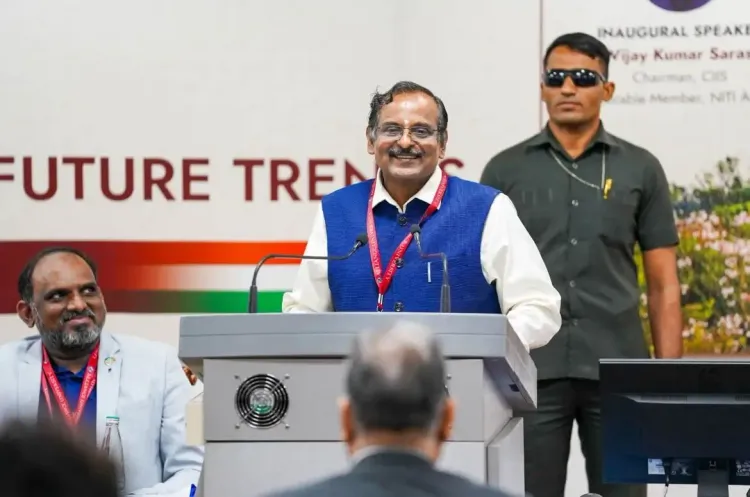How Can Hydrogen Transform India's Space Missions, Transportation, and Clean Energy?

Synopsis
Key Takeaways
- Hydrogen is pivotal for India's clean energy transition.
- ISRO has made significant advancements in hydrogen technologies.
- Hydrogen applications extend beyond rockets to various transportation sectors.
- Safety measures are crucial for the use of hydrogen.
- Collaboration among industries is vital for a robust hydrogen economy.
Bengaluru, Sep 19 (NationPress) Hydrogen is poised to significantly impact India's space endeavors, transportation, and the future of clean energy, asserted Dr. V. Narayanan, Chairman of ISRO, during a recent address.
At the National Workshop on 'Hydrogen Fuel Technologies and Future Trends' held at Alliance University in Bengaluru, in collaboration with the Indian Institute of Science, he elaborated on the versatility of hydrogen in engines and turbines, extending beyond just rocket propulsion.
Dr. Narayanan emphasized India's progress in hydrogen technology while addressing the global imperative for adopting clean fuel.
“Today, the world grapples with two major challenges: the escalating demand for energy and the pressing need to curtail greenhouse gas emissions. In this scenario, hydrogen, recognized as one of the greenest and cleanest fuels, shines as a potential solution. It is integral to numerous advancements at ISRO,” he remarked.
He highlighted the successful launch of the GSLV Mk III rocket, which celebrated its 100th successful mission in January.
“This mission utilized a cryogenic stage powered by liquid hydrogen and liquid oxygen, a technology that was once out of reach for India but is now under our control. Last year, we showcased a 100-watt oxygen-based fuel cell in space, and a 20-kilowatt version is currently undergoing testing,” Dr. Narayanan noted.
“Hydrogen’s potential extends beyond rockets; it is applicable in aircraft, trains, cars, and fuel cells,” he added.
He reminisced about the collaboration between ISRO and Tata Motors in 2010-11 to develop a hydrogen fuel cell-powered bus, which was tested successfully, affirming confidence in this technology.
“As of June 2025, five hydrogen-powered buses commenced commercial operations. Companies such as BHEL and NTPC are actively developing hydrogen systems and gas turbine engines,” Dr. Narayanan mentioned.
He also highlighted the importance of addressing safety concerns, as hydrogen flames are invisible and pose risks, underscoring the urgent need for advanced hydrogen sensors capable of millisecond-level detection.
Discussing ISRO's achievements in cryogenic engines, he stated that three cryogenic propulsion systems are currently operational.
Dr. Vijay Kumar Saraswat, Chairman of CIIS and Member of NITI Aayog, echoed the necessity for a strong hydrogen economy.
“To realize our net-zero goals, India needs to hasten its transition towards a hydrogen economy. Hydrogen holds vast potential in various sectors including mobility, industrial heating, and energy production,” he concluded.










